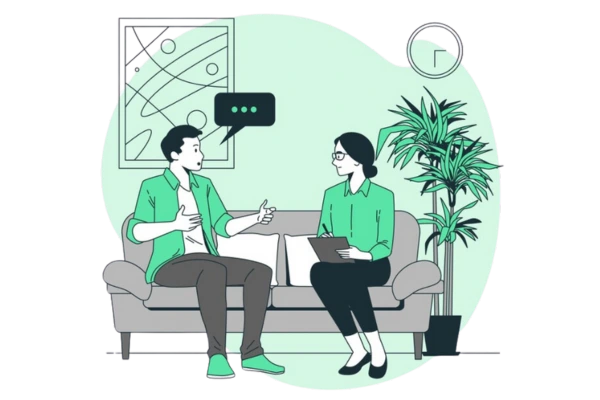
Building Rapport with Psychologist
The Key to Effective Therapy: Building Rapport with Your Psychologist
Therapy is a journey that often requires patience, trust, and collaboration. One of the most critical elements in this process is building a strong Building Rapport with a Psychologist. Rapport isn’t just about feeling comfortable with your therapist; it’s the foundation of an effective therapeutic relationship that promotes open dialogue, mutual understanding, and personal growth. I’ll explore why rapport is so essential in therapy, offer tips for building it, and answer some frequently asked questions about connecting with your psychologist. Building Rapport with Psychologist.
1. Promotes Trust and Openness
Therapy is inherently a vulnerable process. Talking about personal challenges, fears, and traumas requires courage and honesty. When you connect with your therapist, you’re more likely to open up fully. This trust encourages you to explore difficult emotions, leading to breakthroughs and a deeper understanding of yourself. Building Rapport with Psychologist
2. Enhances Collaboration
Therapy isn’t a one-sided endeavor; it’s a collaborative process between you and your therapist. A good rapport allows you to feel like an active participant in your healing journey. You’re more likely to work together to set goals, explore treatment options, and develop coping strategies that suit your needs.
3. Increases Motivation and Engagement
When you feel understood and respected by your psychologist, therapy sessions become more engaging and rewarding. A strong connection can enhance your motivation to show up consistently, do the work, and stay committed to the process.
4. Fosters a Safe and Non-Judgmental Space
Rapport creates a safe space where you feel valued and understood. Knowing that your psychologist genuinely cares and is non-judgmental can make it easier to confront uncomfortable emotions and experiences that are crucial for growth and healing. Building Rapport with Psychologist

Building rapport starts with authenticity. Share openly about what brought you to therapy, your expectations, and your fears. Remember, psychologists are trained to listen without judgment, so you can express yourself freely.
2. Communicate Your Needs and Preferences
It’s helpful to let your psychologist know if some particular approaches or topics resonate with you. If you prefer direct feedback, collaborative brainstorming, or a structured approach, communicate that. This allows your psychologist to tailor sessions to your comfort level.
3. Allow Time for Trust to Develop
Establishing a connection takes time. Don’t expect to feel an instant bond; sometimes, rapport builds gradually over several sessions. Approach each session with patience and an open mind, trusting that the bond will strengthen with time.
4. Share Feedback About the Sessions
It’s okay to tell your psychologist what’s working for you and what isn’t. Sharing constructive feedback helps your therapist understand how to best support you. If a certain approach isn’t resonating, let them know. Therapy is meant to be adaptable to your needs. Building Rapport with Psychologist
5. Ask Questions and Show Curiosity
Engaging in conversation with your psychologist can help build rapport. Don’t hesitate to ask questions about their approach, background, or experience with your type of concerns. Showing interest fosters a sense of partnership and comfort. Building Rapport with Psychologist
6. Practice Vulnerability at Your Own Pace
Opening up in therapy can feel daunting, but take it at your own pace. Share as much as you’re comfortable with at first, knowing that you can gradually reveal more as you feel safer and more connected. Building Rapport with Psychologist
Q1: What if I don’t feel a connection with my therapist?
Answer: Not every therapist is the right fit, and that’s okay. Sometimes, it may take a few sessions to feel a connection. If you find that, after several sessions, you still don’t feel comfortable or understood, it’s reasonable to consider finding another psychologist. Building rapport is essential, and a good therapist will understand if you choose to seek a better match. Building Rapport with Psychologist.
Q2: Can I build rapport with my psychologist if I’m an introvert or find it hard to open up?
Answer: Absolutely. Many introverts and individuals who are initially reserved find ways to connect with their therapists over time. Psychologists are trained to work with people of all personality types, and they know how to create a safe space for you to feel comfortable. Start with small, manageable steps in opening up, and your psychologist will help guide the conversation in a way that feels natural for you. Building Rapport with Psychologist
Q3: How long does it usually take to build rapport?
Answer: There’s no set timeline for building rapport, as it varies from person to person. For some, a connection may develop quickly within the first few sessions, while for others, it may take several weeks. The important thing is to approach therapy with patience and consistency. Give yourself time to become comfortable with your psychologist and allow the relationship to grow organically. Building Rapport with Psychologist
Q4: Is it normal to feel nervous or hesitant in the beginning?
Answer: Yes, it’s completely normal to feel nervous or hesitant when starting therapy. Therapy can feel like unfamiliar territory, and opening up about personal matters is inherently challenging. Many people experience “first session jitters.” Most psychologists are aware of this and will work to make you feel at ease from the start.
Q5: Can I request a different approach if I’m not comfortable with the one my psychologist is using?
Answer: Yes, therapy is flexible and should be adapted to your comfort level and preferences. If a particular therapeutic approach doesn’t feel right for you, share your thoughts with your psychologist. They may adjust their approach or suggest different methods that align better with your personality and needs. Building Rapport with Psychologist.
Q6: What should I do if I start feeling disconnected after initially building a good rapport?
Answer: It’s common for feelings of connection to fluctuate throughout therapy, especially during emotionally intense periods. If you start feeling disconnected, bring it up with your psychologist. Sometimes, it might be related to specific issues you’re working through, and discussing it openly can help reinforce your connection.
Q7: How do cultural or personal differences impact rapport in therapy?
Answer: Cultural, personal, and lifestyle differences can sometimes create unique challenges in therapy. However, psychologists are trained to approach clients with sensitivity, respect, and cultural competence. If you feel that your therapist doesn’t fully understand an aspect of your background or identity, bring it up. Good therapists will welcome the opportunity to learn and make any adjustments needed to help you feel understood.
Q8: Can I request a brief meeting before committing to a therapist?
Answer: Yes, many therapists offer a brief initial consultation, sometimes called an “intake session” or “introductory meeting.” This session allows you to meet the therapist, ask questions, and get a feel for their style before committing. Use this opportunity to assess whether you feel comfortable and their approach aligns with your needs.
Q9: What if I’m not comfortable sharing certain things yet?
Answer: It’s perfectly okay to have boundaries around certain topics. Therapy is a process, and you don’t have to disclose everything at once. Share what feels comfortable; as rapport builds, you may feel more at ease discussing sensitive topics over time.
Q10: How do I know if the rapport with my psychologist is strong enough?
Answer: Good rapport usually feels like a safe, comfortable connection where you feel understood, respected, and accepted. If you find it easy to talk to your therapist, trust them, and feel supported, you likely have a strong rapport. While no relationship is perfect, you should feel that your psychologist is invested in your well-being and respects your perspective.
Final Thoughts: Building Rapport with Psychologist
Building rapport with your psychologist is one of the most vital steps toward a successful therapy journey. This bond doesn’t just make therapy more comfortable; it directly impacts your progress and engagement. Remember that developing rapport takes time, and there’s no one-size-fits-all approach. By communicating openly, being patient, and remaining open to feedback, you can cultivate a strong, trusting relationship that serves as a foundation for growth and healing.
Therapy is most effective when you feel genuinely supported by your psychologist. Take your time, trust the process, and remember that the goal is a partnership that fosters understanding, resilience, and personal transformation. Whether you’re just starting therapy or looking to deepen your existing connection, building rapport can make all the difference.

2 Comments
Psychology Assessment Tools - Indian Counselling Services
December 1, 2024[…] 3. The Bender Visual-Motor Gestalt Test […]
Psychology and Counselling Courses - Indian Counseling Services
December 5, 2024[…] 3. Problem-Solving and Critical Thinking […]